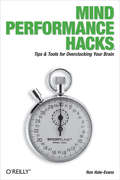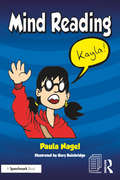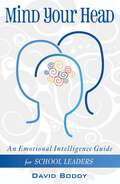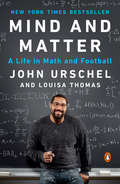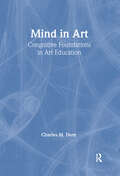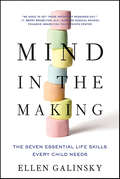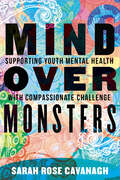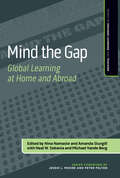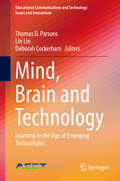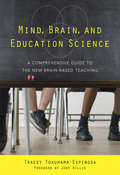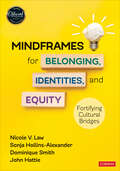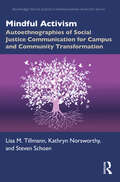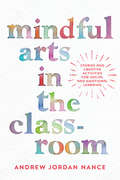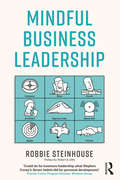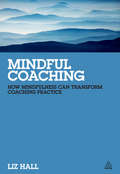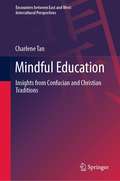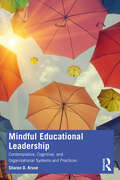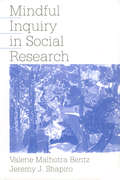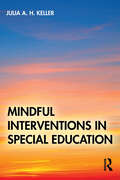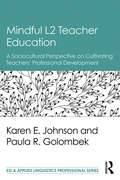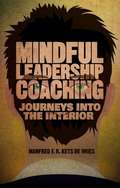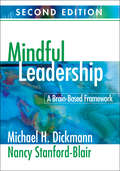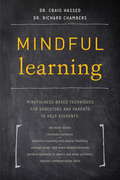- Table View
- List View
Mind Performance Hacks: Tips & Tools for Overclocking Your Brain
by Ron Hale-EvansYou're smart. This book can make you smarter.Mind Performance Hacks provides real-life tips and tools for overclocking your brain and becoming a better thinker. In the increasingly frenetic pace of today's information economy, managing your life requires hacking your brain. With this book, you'll cut through the clutter and tune up your brain intentionally, safely, and productively.Grounded in current research and theory, but offering practical solutions you can apply immediately, Mind Performance Hacks is filled with life hacks that teach you to:Use mnemonic tricks to remember numbers, names, dates, and other flotsam you need to recallPut down your calculator and perform complex math in your head, with your fingers, or on the back of a napkinSpark your creativity with innovative brainstorming methodsUse effective systems to capture new ideas before they get awayCommunicate in creative new ways-even using artificial languagesMake better decisions by foreseeing problems and finding surprising solutionsImprove your mental fitness with cool tricks and gamesWhile the hugely successful Mind Hacks showed you how your brain works, Mind Performance Hacks shows you how to make it work better.
Mind Reading: But What If...; Mind Reading; Stuck On A Loop; Waht Is It? (Rollercoaster Series)
by Paula NagelThis is a focus on feelings of social isolation and unhelpful thinking habits linked to friendship difficulties. Stacie wonders why her best friend, Kayla, ignores her when she sees her in town at the weekend. All weekend she thinks about the possible reasons, and imagines some of the negative things Kayla might be saying or thinking about her. By Monday morning, she has convinced herself they are true, and that Kayla no longer wants to be her friend. She avoids Kayla at school, which causes further problems. At break time Stacie sees Kayla with another group of girls and imagines they are talking about her. At the end of the day Kayla catches up with Stacie and asks her if she has done something wrong. Stacie says she knows Kayla no longer wants to be her friend because she ignored her in town. Kayla explains she had just been fitted with her new contact lenses and didn't even see her! Stacie is shocked and confesses how she imagined she knew what Kayla was thinking and saying about her. Kayla laughs and they joke about Stacie being a very poor 'mind reader'. Stacie agrees that if she catches herself mind reading again then she will test out her thoughts by talking about them. The accompanying, 'Let's talk about.mind reading,' highlights this common thinking error, and suggests further coping strategies. Paul Nagel has worked as an educational psychologist for 17 years. This has included working as a Lead Professional Educational Psychologist managing a traded service, as well as holding Senior Specialist posts for early years and disability. Over the years Paula has worked in multi agency teams within paediatric services, youth offending teams, Sure Start and an anti bullying service. She is currently Principal Educational Psychologist (North) for the national children's mental health charity, Place2Be. Before qualifying as an Educational Psychologist Paula was a primary school teacher. Gary Bainbridge is an artist, comics creator and secondary school Art, Photography and Media Studies teacher from Durham. He's best known for the North East based kitchen sink superhero comic Sugar Glider and the Newcastle-set crime fiction comic, Nightbus. Gary teaches at an academy in Northumberland.
Mind Your Head: An Emotional Intelligence Guide For School Leaders
by David BoddyAt a time when recent governments continue to suffocate head teachers in a sea of bureaucratic initiatives, this book encourages educational leaders to be adventurous, distinctive and above all independent. David Boddy calls on his 30-year passion for philosophy and meditation to inspire heads and aspiring heads to manage the enormous mental and emotional challenges of the job, while still reaching for the best in all around them. Mind Your Head encourages readers to challenge their experiences both as head teachers and more importantly as lead teachers, to educate and to inspire those whose lives they touch on a daily basis: colleagues, parents and, first and foremost, pupils.
Mind Your Head: An Emotional Intelligence Guide For School Leaders
by David BoddyAt a time when recent governments continue to suffocate head teachers in a sea of bureaucratic initiatives, this book encourages educational leaders to be adventurous, distinctive and above all independent. David Boddy calls on his 30-year passion for philosophy and meditation to inspire heads and aspiring heads to manage the enormous mental and emotional challenges of the job, while still reaching for the best in all around them. Mind Your Head encourages readers to challenge their experiences both as head teachers and more importantly as lead teachers, to educate and to inspire those whose lives they touch on a daily basis: colleagues, parents and, first and foremost, pupils.
Mind and Matter: A Life in Math and Football
by Louisa Thomas John UrschelFor John Urschel, what began as an insatiable appetite for puzzles as a child developed into mastery of the elegant systems and rules of mathematics. By the time he was thirteen, Urschel was auditing a college-level calculus course. But when he joined his high school football team, a new interest began to eclipse the thrill he felt in the classroom. Football challenged Urschel in an entirely different way, and he became addicted to the physical contact of the sport. After he accepted a scholarship to play at Penn State, his love of math was rekindled. As a Nittany Lion, he refused to sacrifice one passion for the other. Against the odds, Urschel found a way to manage his double life as a scholar and an athlete. While he was an offensive lineman for the Baltimore Ravens, he simultaneously pursued his PhD in mathematics at MIT. Weaving together two separate narratives, Urschel relives for us the most pivotal moments of his bifurcated life. He explains why, after Penn State was sanctioned for the acts of former coach Jerry Sandusky, he declined offers from prestigious universities and refused to abandon his team. He describes his parents’ different influences and their profound effect on him, and he opens up about the correlation between football and CTE and the risks he took for the game he loves. Equally at home discussing Georg Cantor’s work on infinities and Bill Belichick’s playbook, Urschel reveals how each challenge—whether on the field or in the classroom—has brought him closer to understanding the two different halves of his own life, and how reason and emotion, the mind and the body, are always working together. “So often, people want to divide the world into two,” he observes. “Matter and energy. Wave and particle. Athlete and mathematician. Why can’t something (or someone) be both?”
Mind in Art: Cognitive Foundations in Art Education
by Charles M. DornThis book is for the reader who believes that thinking about and making art is intelligent behavior and that art as a subject in the K-12 school curriculum should not be used as an alibi for other curricular objectives. It examines and makes explicit those cognitive behaviors normally associated with most higher order thinking and problem solving activity and explains how they function in the act of creative forming. Its goal is ultimately to find ways to use these behaviors in the construction of an intelligent art curriculum for K-12 American schools. This is perhaps the only text in the field designed to assist teachers in meeting the challenges of teaching in the Goals 2000 curriculum and evaluation reform effort, acquainting them with both the National Art Standards and with the assessment processes needed in order for them to become accountable. Mind in Art grapples with current and relevant theory, research, and unsolved problems. It is cohesive as it attempts to bring together information that is only partially known, even among those who are college professors. And it takes a critical look at the ideas and points of view that have created divisiveness and shabby thinking in the field. In this book Charles Dorn significantly advances thinking in the field of art education.
Mind in the Making: The Seven Essential Life Skills Every Child Needs
by Ellen Galinsky“Ellen Galinsky—already the go-to person on interaction between families and the workplace—draws on fresh research to explain what we ought to be teaching our children. This is must-reading for everyone who cares about America’s fate in the 21st century.” — Judy Woodruff, Senior Correspondent for The PBS NewsHour Families and Work Institute President Ellen Galinsky (Ask the Children, The Six Stages of Parenthood) presents a book of groundbreaking advice based on the latest research on child development.
Mind over Monsters: Supporting Youth Mental Health with Compassionate Challenge
by Sarah Rose CavanaghAn investigation into the mental health crisis affecting young adults today, and an impassioned argument for creating learning environments characterized both by compassion and challenge.Alarming statistics in recent years indicate that mental health problems like depression and anxiety have been skyrocketing among youth. To identify solutions, psychologist and professor Sarah Rose Cavanagh interviews a roster of experts across the country who are dedicating their lives to working with young people to help them actualize their goals, and highlights voices of college students from a range of diverse backgrounds.Cavanagh also brings the reader on an invigorating tour of pedagogical, neuroscientific, and psychological research on mental health—one that involves her own personal journey from panic to equilibrium.The result of these combined sources of inquiry indicates that to support youth mental health, we must create what Cavanagh calls compassionate challenge— first, we need to cultivate learning and living environments characterized by compassion, and then, we need to guide our youth into practices that encourage challenge, helping them face their fears in an encouraging, safe, and even playful way.Mind over Monsters is a must-read for teachers, administrators, parents, and young people themselves.
Mind the Gap: Global Learning at Home and Abroad (Series on Engaged Learning and Teaching)
by Nina Namaste and Amanda Sturgill with Neal W. Sobania and Michael Vande BergCo-published with There is growing awareness that global learning is not confined to university, credit-bearing off campus international programs, and that institutions of higher learning have, up until now, conceived of global education too narrowly. Global learning through study abroad and off-campus domestic study fits into a larger context of students’ educational experiences. You can find global learning as part of other high-impact practices; domestic off-campus programs, undergraduate research, and service- or community-based learning all can be global learning opportunities. On-campus global learning can occur in the disciplines and in the core curriculum as well. Language and culture, anthropology, sociology, and other departments, multicultural centers, and diversity and inclusivity offices, to name a few, also teach students to be global learners. Global learning pertains to the many staff and faculty educators who intentionally encourage students to engage with and successfully navigate difference. Thus, there is a growing need for bridging across disciplinary and administrative silos, silos that are culturally bound within academia. The gaps between these silos matter as students seek to integrate off- and on-campus learning. Higher education needs a new, holistic assessment of global learning. This book investigates not just student learning, but also faculty experiences, program structures, and pathways that impact global learning, and expands the context of global learning to show its antecedents and impacts as a part of the larger higher education experience. Chapters look at recent developments such as short-term, off-campus, international study and certificate/medallion programs, as well as blended learning environments and undergraduate research, all in the context of multi-institutional comparisons. Global learning is also situated in a larger university context. Visit the Mind the Gap Companion Page, hosted by the Center of Engaged Learning.
Mind, Brain and Technology: Learning in the Age of Emerging Technologies (Educational Communications and Technology: Issues and Innovations)
by Thomas D. Parsons Lin Lin Deborah CockerhamAs technology becomes increasingly integrated into our society, cultural expectations and needs are changing. Social understanding, family roles, organizational skills, and daily activities are all adapting to the demands of ever-present technology, causing changes in human brain, emotions, and behaviors. An understanding of the impact of technology upon our lives is essential if we are to adequately educate children for the future and plan for meaningful learning environments for them. Mind, Brain and Technology provides an overview of these changes from a wide variety of perspectives. Designed as a textbook for students in the fields and interdisciplinary areas of psychology, neuroscience, technology, computer science, and education, the book offers insights for researchers, professionals, educators, and anyone interested in learning more about the integration of mind, brain and technology in their lives. The book skilfully guides readers to explore alternatives, generate new ideas, and develop constructive plans both for their own lives and for future educational needs.
Mind, Brain, and Education Science: A Comprehensive Guide to the New Brain-Based Teaching
by Tracey Tokuhama-EspinosaEstablishing the parameters and goals of the new field of mind, brain, and education science. A groundbreaking work, Mind, Brain, and Education Science explains the new transdisciplinary academic field that has grown out of the intersection of neuroscience, education, and psychology. The trend in "brain-based teaching" has been growing for the past twenty years and has exploded in the past five to become the most authoritative pedagogy for best learning results. Aimed at teachers, teacher trainers and policy makers, and anyone interested in the future of education in America and beyond, Mind, Brain, and Education Science responds to the clamor for help in identifying what information could and should apply in classrooms with confidence, and what information is simply commercial hype. Combining an exhaustive review of the literature, as well as interviews with over twenty thought leaders in the field from six different countries, this book describes the birth and future of this new and groundbreaking discipline. Mind, Brain, and Education Science looks at the foundations, standards, and history of the field, outlining the ways that new information should be judged. Well-established information is elegantly separated from "neuromyths" to help teachers split the wheat from the chaff in classroom planning, instruction and teaching methodology.
Mindframes for Belonging, Identities, and Equity: Fortifying Cultural Bridges
by John Hattie Dominique Smith Sonja Hollins-Alexander Nicole V. LawThe essentials for creating a supportive and inclusive space for all Learning is hard work and the latest education research shows that a sense of psychological safety is a must if we want students to successfully progress along their education journey. In Mindframes for Belonging, Identities, and Equity, you′ll discover 10 unique mindframes backed by extensive education research and real-life scenarios. Through self-reflection and powerful vignettes, you′ll learn how to apply these core principles in your daily life to foster a more inclusive and understanding learning environment. Inside, the authors explore the five critical themes behind these mindframes, including Impact and Efficiency Feedback and Assessment Challenging Growth Learning Culture and Relationships Ownership and Accountability Harnessing the power of these mindframes is not just about improving education--it′s about fostering an environment where every student feels valued, safe, and able to learn without fear.
Mindframes for Belonging, Identities, and Equity: Fortifying Cultural Bridges
by John Hattie Dominique Smith Sonja Hollins-Alexander Nicole V. LawThe essentials for creating a supportive and inclusive space for all Learning is hard work and the latest education research shows that a sense of psychological safety is a must if we want students to successfully progress along their education journey. In Mindframes for Belonging, Identities, and Equity, you′ll discover 10 unique mindframes backed by extensive education research and real-life scenarios. Through self-reflection and powerful vignettes, you′ll learn how to apply these core principles in your daily life to foster a more inclusive and understanding learning environment. Inside, the authors explore the five critical themes behind these mindframes, including Impact and Efficiency Feedback and Assessment Challenging Growth Learning Culture and Relationships Ownership and Accountability Harnessing the power of these mindframes is not just about improving education--it′s about fostering an environment where every student feels valued, safe, and able to learn without fear.
Mindful Activism: Autoethnographies of Social Justice Communication for Campus and Community Transformation (Routledge Social Justice Communication Activism Series)
by Lisa M. Tillmann Kathryn Norsworthy Steven SchoenThis collection immerses scholars of communication and related disciplines in narratives of and conversations about social-justice-focused activism. Through autoethnographic essays, Mindful Activism chronicles the authors’ experiences as activist academics challenging and seeking to remedy injustices on campus and in local and global communities. Those experiences range from engaging in a single activist act to collaborating over many years with oppressed communities and social change groups. Building upon communication activism research and following a liberation-based transformative learning model, the book shows both activism in action and deep reflection on that activism. The authors re-experience activist experiences, draw out lessons, and invite readers to apply those to their own social justice endeavors. Mindful Activism also demonstrates how mindfulness supports activists in deepening their awareness and understanding of themselves, others, and social systems. This orientation increases the likelihood that activists will remain grounded enough to respond to injustice mindfully/effectively. The book will enrich courses on activism, social justice, dialogue, narrative inquiry, qualitative methods, autoethnography, and general graduate studies, and will resonate with scholars committed to building a more equitable and just world.
Mindful Arts in the Classroom: Stories and Creative Activities for Social and Emotional Learning
by Andrew Jordan NanceWritten especially for the teacher or camp director who wants to bring mindfulness, social and emotional learning (SEL), and the arts into their busy day through storytelling and fun games, this book offers a complete course that helps kids identify and talk about their feelings, self-regulate and self-soothe when stressed, and learn from easy mindfulness practices.Educator and theater director Andrew Nance is the author of the popular children's book Puppy Mind, which brought a new dimension of cuteness to the practice of mindfulness in the form of a rambunctious, playful puppy. In this book, Nance brings the puppy and a host of other friendly characters into the classroom to animate a 21-lesson curriculum centered around lively stories and easy-to-lead exercises for young students from kindergarten to third grade. Nance offers a teacher's guide to arts-based mindfulness exercises utilizing story-telling, theater games, and drawing to spark students' self-expression, self-awareness, and social and emotional well-being.
Mindful Business Leadership
by Robbie SteinhouseMindful Business Leadership presents a new model of leadership. It introduces ten very different leadership roles that are required to meet the challenges of modern business. Memorable metaphors and images are created for each, and they are placed in a matrix. Readers are shown how to develop these roles within themselves. Potentially negative aspects of each are discussed, along with material on how to put these to creative use. The book argues that mindfulness is the best way to balance the roles – a mindful leader will know ‘who to be’ in any situation. The last part is taken up with clear, practical exercises that readers can practice to become more fully mindful and develop a clear vision for their own leadership. Mindful Business Leadership is relevant to anyone, anywhere in the world, who is moving (or wishes to move) to a position of leadership.
Mindful Coaching
by Liz HallMindfulness is a way of paying attention to the present moment, helping us become more aware of our thoughts and feelings so that instead of being overwhelmed by them, we're better able to manage them. Mindful Coaching is the complete resource to using mindfulness in coaching. It helps coaches work with clients on a range of issues including work-life balance; stress management; decision-making; coping with ambiguity; dealing with crises; employee engagement; heightening focus and clarity; communication; increasing presence; improved listening and more. It also helps them become more resilient themselves, particularly helpful in the current climate in which many coaches are facing increasing challenges. The book helps coaches appreciate the benefits of mindfulness, work out with which clients and in which situations it could be useful and illustrate how it can be applied with case studies and resources.
Mindful Education: Insights from Confucian and Christian Traditions (Encounters between East and West)
by Charlene TanThis book provides original ideas and practical recommendations for educators in a post-pandemic world. We live in a world that has been upended by the COVID-19 pandemic. Students around the globe have been besieged by disruptions that threaten not only their academic learning but also their mental, emotional, and interpersonal well-being. In the midst of pressing and mounting challenges, how can schools ensure the total wellness of all their students? Beyond reactive, piecemeal, and short-term measures, how can schools enact mindful education that pays attention to wholeness in every student? Extending the current research on well-being and mindfulness, this book draws insights from Confucian and Christian traditions. These two traditions have been selected as they are widely seen to represent, and have impacted, Eastern and Western civilisations respectively for millennia. Informed and inspired by Confucian and Christian perspectives, this book proposes that mindfulness is an orientation towards wholeness, where one experiences he (harmony) and shalom (peace). Mindful education is realised through: A school community of ren (humanity) and agape (love); A transforming curriculum that centres on dao (way) and imago dei (god’s image); Empathic teachers who are motivated by shu (putting oneself in the other’s place) and the Golden Rule (do to others as you would have them do to you); and Self-directed learners who develop themselves through xiuji (self-cultivation) and spiritual disciplines. Applying ancient wisdom to contemporary settings, this book on promoting student well-being through mindful education is a useful resource for policymakers, educators, researchers, and general readers.
Mindful Educational Leadership: Contemplative, Cognitive, and Organizational Systems and Practices
by Sharon D. KruseMindful Educational Leadership unpacks the literature of mindfulness as it applies to K12 school leadership. Crossing disciplinary and theoretical boundaries, scholar and mindfulness coach Sharon Kruse explores mindfulness in three complementary research and philosophical traditions—contemplative, cognitive, and organizational—and applies it to school leadership. This book explores how these perspectives complement and inform each other and the ways in which understanding each can inform decision making, school/community engagement and responsiveness, and advancing equity in school organizations. Full of authentic examples, stories, and models of mindful leadership from real educators, this volume helps readers become more mindful and effective in their practice. An exciting resource for aspiring educational leaders, each chapter also includes supporting resources for study, practice, and reflection on key concepts.
Mindful Inquiry in Social Research
by Dr Valerie Malhotra Bentz Dr Jeremy J. ShapiroThis innovative introduction to research in the social sciences guides students and new researchers through the maze of research traditions, cultures of inquiry and epistemological frameworks. It introduces the underlying logic of ten cultures of inquiry: ethnography; quantitative behavioral science; phenomenology; action research; hermeneutics; evaluation research; feminist research; critical social science; historical-comparative research; and theoretical research. It clarifies conceptual and intellectual traditions in research, and puts researchers firmly in the investigative saddle - able to choose, justify, and explain the intellectual framework and personal rationale of their research.
Mindful Interventions in Special Education
by Julia A. KellerBridging the gap between theory and practice, Mindful Interventions in Special Education helps aspiring educators develop their intervention toolkit. Covering topics from dyslexia to hypoactivity, each chapter provides an overview of the theoretical and research-based rationale alongside an illustrative case study for each intervention being discussed. Each intervention features mindful and strength-based remediation strategies and reflection questions to deepen readers’ understanding. Addressing a wide array of common scenarios, this thoughtful resource is ideal for anyone seeking to effectively build inclusive classrooms and support students’ social-emotional learning.
Mindful L2 Teacher Education: A Sociocultural Perspective on Cultivating Teachers' Professional Development (ESL & Applied Linguistics Professional Series)
by Karen E. Johnson Paula R. GolombekTaking a Vygotskian sociocultural stance, this book demonstrates the meaningful role that L2 teacher educators and L2 teacher education play in the professional development of L2 teachers through systematic, intentional, goal-directed, theorized L2 teacher education pedagogy. The message is resoundingly clear: Teacher education matters! It empirically documents the ways in which engagement in the practices of L2 teacher education shape how teachers come to think about and enact their teaching within the sociocultural contexts of their learning-to-teach experiences. Providing an insider’s look at L2 teacher education pedagogy, it offers a close up look at teacher educators who are skilled at moving L2 teachers toward more theoretically and pedagogically sound instructional practices and greater levels of professional expertise. First, the theoretical foundation and educational rationale for exploring what happens inside the practices of L2 teacher education are established. These theoretical concepts are then used to conduct microgenetic analyses of the moment-to-moment, asynchronous, and at-a-distance dialogic interactions that take place in five distinct but sometimes overlapping practices that the authors have designed, repeatedly implemented, and subsequently collected data on in their own L2 teacher education programs. Responsive mediation is positioned as the nexus of mindful L2 teacher education and proposed as a psychological tool for teacher educators to both examine and inform the ways in which they design, enact, and assess the consequences of their own L2 teacher education pedagogy.
Mindful Leadership Coaching
by Manfred F. R. Kets de VriesMindful Leadership Coaching takes an in-depth look at the coaching processes. The insights provided here will help coaches and executives to use frameworks for transforming attitudes, beliefs, and behaviors. It advises on how the best leadership coaches help their executive clients create significant personal and professional change.
Mindful Leadership: A Brain-Based Framework
by Michael H. Dickmann Professor Nancy Stanford-BlairUnleash the power of the leadership-brain connection! Offering an approach compatible with the ways individuals naturally process information and learn, this updated edition ofConnecting Leadership to the Brain links knowledge about the physiological, social, emotional, constructive, reflective, and dispositional nature of the brain to compatible leadership practice. Leaders will find specific examples and reflection exercises focused on how to: Support the mind-body connection Promote social relationships Harness the power of emotion Expedite the construction of knowledge Build a culture of reflection Cultivate productive dispositions of mind
Mindful Learning
by Dr Richard Chambers Dr Craig HassedMindfulness-based stress reduction (MBSR), as pioneered by Jon Kabat-Zinn and others, is now being successfully applied in myriad areas of human activity--and most recently, in education. It's no surprise that psychologists and educators have found that mindfulness-based practices improve attention and performance and reduce stress in the classroom and in other school-based activities. This practical guide explains mindfulness and its applications and shows educators how it can be used with students.Topics include * cultivating resilience and managing stress * emotional development * communication and relationships * mindful use of technology * mindfulness for enhancing creativity * mindfulness and sports * teaching with attention * working with resistance * managing personal stress in the classroom * and much more This book is essential reading for teachers, counselors, parents of children high-school-age and above, and college and graduate students.
